The writing
Mayakovsky's innovation manifested itself primarily in the variety of styles, genres, and manner of writing that he used. It is therefore natural that the early work of the poet developed in the canvas of Russian futurism:
* I immediately blurred the map of everyday life,
* splashing paint from a glass;
* I showed jelly on a platter,
* oblique cheekbones of the ocean.
Figurativeness, the use of colors as symbols, the unfolding of metaphors and at the same time the brevity of the presentation of the idea - these are the qualities Mayakovsky learned from the futurists. But in the post-October period, his poetry is completely different. Here the same clear, rigid, measured rhythm appears that we are so familiar with:
* ... Chest forward brave!
* Paste over the sky with flags!
* Who is walking right there?
* Left!
* Left!
* Left!
In this passage, every word sounds like a hammer blow, like a death sentence. Here Mayakovsky's skill is fully manifested. The poet's love lyrics remain a mystery to us to this day. On the one hand, he sings love like a torch, like a star, like the sun. He writes about love as an indomitable force, to which “... a hurricane, fire, water rises in a murmur. Who will be able to cope? Can you? Try ... ". Love is like fire - this is his understanding. But on the other hand, he considers it unacceptable to "waste" his time on such a "useless" thing. Before us appear two people - a man-duty and a man-poet, who exist in eternal conflict.
Mayakovsky is known not only as a poet, he tries himself in prose and drama. His "Mystery Buff" is staged in one of the theaters in Petrograd. For a poet, nothing is permanent - he tries to cover the entire spectrum of literary creativity. "Hammer-sickle", "eagle", "naked" - the words familiar to us from childhood. The neologisms invented by him live to this day. Work in the ROSTA windows played an important role in the artistic development of Mayakovsky. In his own words, he "... cleared the language of poetic husks on topics that do not allow verbosity." There is also another facet of Mayakovsky's talent - the talent of a painter. Whole generations of people know his propaganda posters and signatures under them:
* Eat pineapples, chew grouse,
* your last day comes, bourgeois.
Sharpness, topicality, brightness, precision - all these epithets fit them. The poet's agitational talent began to manifest itself in his public speeches. Nobody could speak at rallies like him. At a meeting of workers in New York. "" Thousands of sparkling eyes were fixed on the stage. They waited with bated breath for the "hero of the latest Soviet poetry." Mayakovsky led people behind him, even “... stepping on the throat of his own song”. In addition to all this, Mayakovsky also had amazing organizational skills. It was he who, together with David Burliuk, was the "founding father" of Russian futurism. On his shoulders was such a giant of the literary industry as Lef. And at the same time, he found time to arrange creative evenings, Trips around the country, abroad, and write, write, write ...
Mayakovsky is a very extraordinary personality, multifaceted talent. He was able to reflect in his work an entire era - the time of the selfless builders of their future, the time of the overthrow of the autocracy, the time of a turning point. You can relate to his poetry in different ways, but one thing is indisputable: Mayakovsky is a real talent that cannot be drowned out, that lives forever!
* Listen!
* After all, if the stars
* light up -
* means - someone needs it?
* Means, ~ it is necessary.
* so that every evening
* over roofs
* at least one star lit up ?!
Mayakovsky first entered literature with the appearance of the manifesto "A Slap in the Face to Public Taste", which outlined the program of the Futurists. He does not just enter literature, but bursts in, introduces fundamental changes into it. In the manifesto, he calls the futurists "the face of our time", sets out their proposal "to throw Pushkin, Dostoevsky, Tolstoy and others off the steamer of our time." Says that they proclaim "irresistible hatred for the language that existed before them." Requires "an increase in the vocabulary in its volume by arbitrary and involuntary words", thereby creating a "word-of-mouth".
Futurism had a great influence on the early work of V. Mayakovsky. As "word-of-mouth" the poet, using traditional ways of forming words, creates his own, new forms: mock, December evening, love, tearful eyes, the rain wept and others. Mayakovsky made a radical change in the technique of Russian verse. He established new methods of rhyming that are close to the orator's word. In his article "How to Make Poems?" Mayakovsky wrote that he puts the most characteristic word at the end of the line and selects a rhyme to it. Mayakovsky violates the so-called syllabo-tonic verse, established by V. Trediakovsky's reform at the beginning of the 15th century, and creates tonic versification, in which the length of the verse is determined by the number of full-stressed words.
Mayakovsky uses a staircase structure of verse, where each word - "step" - has a logical stress and carries a certain semantic load. Using, at first glance, ordinary lexical units, sometimes with new forms of education, Mayakovsky was able to create stunning metaphors: "pedestrianized the chest", that is, they went back and forth, up and down. An often overwhelming metaphor unfolds throughout the entire stanza:
Here I am, all the pain and bruise.
I will bequeath to you a fruit garden
my great soul.
Almost every work of Mayakovsky contains a large number of metaphors - stunning, materializing, expanded; various comparisons - "I will lead like a pug on Papomon's chain" and others, neologisms, hyperbole, less often - the method of contact repetition ("Glory, Glory, Glory to the heroes !!!") In the theme of all the early works of V. Mayakovsky there is something in common: a person great love, passion, a person "for the heart" turns out to be unnecessary, inappropriate, ridiculed. In them - a cry of pain, despair, curse because of the lies and meanness of the surrounding world. The poet is waiting for the appearance of a real person: "Again, longing for people, led, I go ...". The poet has a "longing for people", a craving for man; but now, looking around, he sees that in front of him, instead of a man, is some strange creature devoid of a human appearance:
Two yards of faceless pinkish dough:
If only the mark was embroidered in the corner.
No faces, no people - this is the main idea of \u200b\u200bmany poems by early Mayakovsky.
An hour from here to a clean lane
your bloated fat will flow out over the person ...
Fat, glossy creatures make up the mass of those around. If Blok wrote in "Dances of Death": "How hard it is for the dead among people ...", then about the tradition of the young Mayakovsky one can say: how hard it is among the dead for the living. Extrovert Mayakovsky appeals to people, but does not find understanding. During this period, the poet's share is characterized by a heightened sense of loneliness, close to Lermontov's or Yesenin's. More and more often, prison outlines appear in the early lyrics, the image "life is a prison" is indicated, associations arise that carry the idea of \u200b\u200bunfreedom: a god caught by a lasso in the sky; policemen crucified at the crossroads. In the poem "To Everything" this image grows to enormous proportions:
The whole earth is a convict with half
sun-shaven head!
Life in Mayakovsky's early poems - not free, chained, crossed out prison bars.
Half a life has passed, now you cannot escape ...
I'm in captivity. I have no ransom.
The earth bound, cursed.
I would redeem everyone in my love,
yes, her ocean is enclosed in the house!
Life is imprisoned, the "ocean of love" is enclosed in houses - this is how reality appears in Mayakovsky's early poetry. Together with the image of a prison, a "pen", a chained land, another image, at first tragically colored, develops in Mayakovsky's work - the image of the sun. The early Mayakovsky's sun often appears in a gloomy light. The sun is a tormentor who sheds the blood of people; the sun, barely seeping into a tiny crack, "like a small festering wound," immediately hides, dims, defeated by darkness and crampedness. The sun is "the autocrat of the sky", fat and red, traveling "along the paths of the roofs. Early Mayakovsky dreamed of "slanting cheekbones of the ocean", he dreamed of the vast expanses of life. The image of the ocean, like the image of the sun in the early years of creativity, is internally constrained, not free. As the sun is obscured by a grating, so the ocean is clamped in a vice.
The love of the whopper, the "sphinx" of Mayakovsky is grandiose, great:
My love
As an apostle during it,
I'll blow the roads by a thousand thousand.
The poet is "perfectly ill", he has a "fire of the heart." In the poem "A Cloud in Pants" love is necessary, it is beautiful, even if it brings pain:
Through life I drag
Millions of huge pure Loves
And a million little dirty love.
There are notes of despair in the "Flute-spine"; destruction is directed at itself: "Anyway, I know, I will die soon." In the poem "To everything" Mayakovsky, calling himself "the greatest Don Quixote" says:
Only in my fevered brain was you!
Was ... Love is leaving.
And in the poem "War and Peace" the poet is afraid to stumble, to lose what is left:
I will stumble - and the last little love
forever sink into a smoky pool
In the poem "Man" Mayakovsky is in the flame of love.
Only my pain is sharper - I stand with fire,
On the fire of unthinkable love
The fire is non-combustible, but love is unthinkable, and the pain is getting sharper ... And Mayakovsky is thrown into another element. He turns to the theme of the poet's art, his work. Here the poet extols unbridledness, freedom of creative imagination. In a loud voice he declares that he is not like everyone else, and his fantasy can turn the whole world:
Could play nocturne
On the downspout flute?
He is "the priceless words of a mot and a spender." The poet is not protected from the dirt of the surrounding world, which is perched "on the butterfly of the poetic heart." In the poem "Hey" it is clearly seen that the poet's fantasy really knows no boundaries:
Hey! Man, the earth itself
call for a waltz!
Mayakovsky, in his poem "The Worker Poet", proves that the work of a poet is the same as that of a turner, there is no difference between a technician and a poet. They are equal.
Hearts are such motors.
The soul is the same cunning engine.
The main, leading theme for the young Mayakovsky is poetry.
I want one poison -
drink and drink poetry.
The poetry of the poet is inextricably linked with his life.
See - by the nails of words
i am nailed to the paper.
Assessing his work as something higher, inhuman, the poet writes:
Forget the year, day, number.
I lock myself alone with a sheet of paper
Become enlightened by suffering
words of inhuman magic.
Mayakovsky's poetry is "inhuman magic".
Mayakovsky's works combine the best traditions of Russian classical literature and the innovation of the poetry of the socialist era.
Opponents of Mayakovsky tried to portray him as a nihilist, accused of a disdain for cultural heritage. Mayakovsky strongly objected to these fabrications. In response to the accusation of “destroying the classics,” he said in 1930: “I have never done this stupid thing ...”
Mayakovsky's attitude to the greatest Russian poets of the 19th century testifies to how highly he appreciated the great masters of the classics.
When our country celebrated the 125th anniversary of the birth of Pushkin, Mayakovsky wrote a famous poem - "Jubilee" (1924) and in it he expressed his deep love for the great poet. “I love you, but alive, not a mummy!” Mayakovsky exclaims passionately, protesting against the “textbook gloss” that pseudo-learned pedants directed at the poet.
Mayakovsky highly appreciated Lermontov. He defended the poet from vulgar critics, ridiculed their attempts to declare him "an individualist, because, he said, in his poetry there are" whole choirs of heavenly bodies and not a word about electrification. " In the poem "Tamara and the Demon" Mayakovsky used images of Lermontov's poetry.
Inheriting the best traditions of the classics, Mayakovsky at the same time acted as a poet-innovator. For new content, he found new means of artistic expression. Artistic innovation was born of a new era in the development of mankind - the era of the proletarian revolution. In the struggle of the peoples of Russia for the victory of socialism, the personality of the poet was formed. The revolutionary era determined the content and nature of his lyrics, the originality of his poetic style, which so organically fused realistic accuracy and concreteness of the image with the scale of the poetic vision of the world.
By bringing poetry closer to politics, Mayakovsky put art at the service of the revolution. A master of political posters, newspaper verse, he used the means and methods of artistic convention in an unusually wide and original way in his work. His metaphor not only obeys a specific ideological concept, but also absorbs the most important social associations of the era. So, for example, the images of the revolution-flood are born, as well as the expanded image of the “army of poetry”. The hyperbolism characteristic of Mayakovsky's style becomes a political reflection of the intensity of social clashes and the gigantic scale of the country's socialist transformations characteristic of the revolutionary era. With an unprecedented breadth, Mayakovsky introduces live modern speech, the socio-political phraseology of the era into the poetic language. His poetry is based on colloquial speech. “Most of the tone of things is built on colloquial intonation,” Mayakovsky wrote. It was no accident that he gave the title to many of his poems: "conversation", "story", "message", etc. Most often in the works of Vladimir Mayakovsky one can hear the oratorical intonations of the poet-tribune, "agitator, leader".
Mayakovsky constantly fought against the false idea that there is a special "poetic language" that alone can write poetry. He sharply criticized poets who wrote in conventionally poetic jargon.
With the same energy he fought against literary clichés, hackneyed, dead, meaningless expressions. Mayakovsky widely used all the riches of the Russian language. When it was needed, the poet did not neglect the old words: archaism and Slavism. Mayakovsky also often used neologisms - words created by himself. Their peculiarity is that they were created on the basis of commonly used Russian words and were always clear in their meaning: "Hammer-shaped, sickly Soviet passport", "I love our plans huge", etc. Both these and other neologisms of Mayakovsky have the goal of most expressively revealing the content of the poem, its meaning.
Rhyme is of great importance in Mayakovsky's works. But the poet was not satisfied with the old way of rhyming. He often rhymes words, taking into account not only their endings, but also the preceding sounds, not only the literal coincidence of syllables, but also the consonance of words. Mayakovsky's rhymes are extremely diverse and expressive.
It must be said that in the post-October years, Soviet poetry has put forward many names that have taken their place on a par with the greatest poets of the past. And we can safely say that in the entire history of Russian literature there has not yet been such a period when in a relatively short historical period such an abundance and variety of poetic talents would appear. Plekhanov and Selvinsky, Pasternak and Yesenin, Lugovskoy and Zabolotsky, Bagritsky and Prokofiev, Tvardovsky and Leonid Martynov, Svetlov and Aseev, Marshak and Antokolsky - this is by no means an exhaustive list of the names of Mayakovsky's contemporaries that we can be proud of. And this is undoubtedly a huge wealth! Each of the named writers is a bright original poetic value, each of them can deservedly be called a great poet.
And among these poets we single out Mayakovsky, calling him not only "great", but also great. This man has won a special place even among the best of our best poets.
Mayakovsky enters the poetry arena at a difficult, turning point for Russia. The atmosphere is heated to the limit. The first Russian revolution, drowned in blood, and the whirlwind of the world war make people doubt all the previous values. They yearn for change and look to the future with hope. In art, as if in a mirror, these complex social processes are reflected. This is one of the secrets of the popularity of futurism with its outright denial of traditional culture, shocking bourgeois everyday life, almost a religious cult of technology and modern industry and its superhuman might.
Mayakovsky sees “the inevitability of the collapse of old things” and by means of art anticipates the coming “world revolution” and the birth of “new humanity”. "Rush into tomorrow, go ahead!" - that's his motto.
driving into the unfamiliar.
This unfamiliar, unknown becomes the subject of his poetry. He makes extensive use of the technique of contrasts: dead objects come to life in his poetry and become more animate than living ones. Mayakovsky's poetry with its urbanistic-industrial pathos contrasts the image of a modern city with many thousands of people with its busy streets, squares, humming cars - pictures of nature, which seems to him to be something inert and hopelessly dead. The poet is ready to kiss the “smart muzzle of the tram”, he sings the city lantern, which “takes off a blue stocking from the street,” while his moon is “flabby,” “useless,” and the girl’s heart is lifeless, as if “boiled in iodine ”. The poet is convinced that a new word can only be said in a new way. Mayakovsky is a pioneer who owns words and vocabulary, like a brave master who works with his material according to his own laws. He has his own structure, his own image, his own rhythm and rhyme. The poet fearlessly breaks the usual poetic form, creates new words, introduces low and vulgar vocabulary into poetry. In relation to the greatest phenomena of history, he adopts a familiar tone, he speaks of the classics of art with disdain:
The classics are taken,
roll up into a tube
and passed through a meat grinder.
Mayakovsky loves contrasts. The beautiful coexists with the ugly, the high - with the low: "Prostitutes, as a shrine, will carry me and show God in their defense." All his poems are deeply personal, he is present in each of them. And this concrete presence becomes a reference point, a coordinate system in the unrestrained stream of his imagination, where time and space are shifted, where the great seems insignificant, and the intimate, intimate grows to the size of the universe. He stands with one foot on Mont Blanc, the other on Elbrus, with Napoleon he is on “you”, and his voice (“shouting”) drowns out the thunder.
He is the Lord God who creates his poetic world regardless of whether anyone likes his creation. He doesn't care that his deliberate rudeness might shock anyone. He is convinced that everything is allowed to the poet. The lines from the poem “Nate!” Sound like a daring challenge and “slap in the face to public taste”:
And if today to me, a rude Hun,
you don't want to grimace in front of you - and now
i will laugh and happily spit,
spit in your face
i - the priceless words spender and mot.
Mayakovsky has a completely new vision of the world, as if he turns it inside out. The habitual appears in his poetry as strange and bizarre, the abstract becomes tangible, the dead - alive, and vice versa: “Tears of snow from the flags of reddened eyelids”; "The boats pressed against the cradles of entrances / to the nipples of the iron mothers."
Siliavo Danil
The questions of V. Mayakovsky's poetic innovation in the field of versification are considered. Attention is paid to his special style, rhyme, use of neologisms.
Download:
Preview:
Municipal budgetary educational institution
Bokhan secondary school №2
ESSE
“Poetic innovation of V.V. Mayakovsky "
Completed by: Siliavo Danil
9th grade student
MBOU Bokhanskaya secondary school №2
Head: Malkova N.A.
russian language teacher and
literature MBOU Bokhanskaya
School No. 2
bohan village, 2016
V.V. Mayakovsky enters the poetry arena at a difficult turning point for Russia. He sincerely believes in the ideals of the revolution and therefore his poetry is always politicized. I.Luppol: “The October socialist revolution called Mayakovsky to a new life, it kind of put him on the rails, from which he never left”. During this period, new poetic forms appear, traditional themes begin to sound differently; an unusual poetic language emerges.
V.V. Mayakovsky is considered an innovator in the field of versification. His special style, attention to the rhythm of the poem, non-traditional rhymes, the use of new words - all this distinguishes Mayakovsky's poetry from traditional lyrics.
In the poetic system of Mayakovsky, rhymes, truncated lines, verses with different strokes are very important. The poet uses his own style of writing a poem, thus the poet highlights significant semantic lines with pauses. This is how a painful atmosphere of hopelessness is whipped up in the poem "A Good Relationship to Horses":
Horse for a circle (pause)
Behind the onlooker onlooker (pause)
Pants that came to the Kunetsky to flare (pause
Huddled together ... "
Such an unconventional breakdown of the poem into lines helps the poet to draw the reader's attention to the most important thing, the feeling of hopelessness is conveyed not only lexically, but also syntactically, through a special breakdown of the line.
V. Mayakovsky paid increased attention to the word, therefore in his works we meet a lot of author's neologisms - words invented by the poet himself, they most fully reveal the essence of the poetic concept, convey the shades of the author's speech. In the poem "An unusual adventure that happened with Vladimir Mayakovsky in the summer at the dacha" there are many author's neologisms: "zlotolyubo", "yas", "ringing". "Let's drink". The poet plays with words and rhymes, therefore, for example, in this poem there are homonyms: “I drive back the lights for the first time since creation. Did you call me? Drive teas, poet, jam; synonyms: "sun", "gold-loving", "luminary". V. Mayakovsky's poetic vocabulary is always unusual and the reader discovers new meanings of traditional words and forms. Traditional themes sound differently in Mayakovsky's poetry. For example, in the poem "Sitting Down" the theme of bureaucracy is revealed by the poet through the mixing of fantasy and reality, the creation of grotex situations when people
... in two meetings at once
In a day
Sessions for twenty
We must be in time.
Inevitably, you have to break.
Up to the waist here
But other
There"
In the same poem, another innovative technique of Mayakovsky is used: mixing of lexical styles. Within the framework of one work, there are words and expressions that are closely related to the realities of the modern poet of the time, and on the other hand, there are also obsolete words and forms.
Thus, V.V. Mayakovsky was an innovator in the field of versification in poetry of the early 20th century.
Mayakovsky's passionate, relentless striving for the future is associated with the fact that he did not accept much in his life today. He is still “an outcast throughout today” (“About this”, 1923). The motives of world sorrow are still heard in his poems: “Our planet is not well equipped for fun”, “This time is difficult for a pen” (“For Sergei Yesenin”, 1925). Doesn't leave him feeling lonely:
I'm bored
Here
One
Ahead -
the poet
It doesn't take much, -
let be
Only
Time
Hurry up to give birth
someone like me
The swift one.
(“City”, 1925)
The ironic lines in the elegiac poem of 1925 "Shallow philosophy in deep places" are piercingly sad:
Years are seagulls.
Will fly out in a row -
and into the water -
Stuff the belly with a fish.
The seagulls disappeared.
In essence,
where are the birds?
I was born,
Ros,
Fed with a pacifier, -
lived,
Have worked,
Got a bit old ...
So life will pass
How did the Azores
islands.
The poet was only thirty-two years old when he wrote this poem. The thought of a passing life, a premonition of impending death does not let him go. They also appear in the 1926 poem "Conversation with the financial inspector about poetry":
Car
Souls
You wear out over the years.
They say:
- to the archive,
Signed up,
It's time! -
Loves less and less
Dares less and less
and my forehead
Time
Crushes with a running start.
Comes
The worst of amortization -
depreciation
Hearts and souls.
Eternal, not connected with the spite of the day, not dictated by agitprop and social order, themes arose in Mayakovsky's poems not "by the mandate of duty." They sounded like dissonance in the Soviet era of state life-affirmation. Then something completely different was required. This is how Nikolai Tikhonov formulated these demands in his speech at the 1st Congress of Writers: “The new humanity rejected the theme of world sorrow as unnecessary. We strive to become masters not of world sorrow, but of world joy ”.
Mayakovsky was by nature a tragic poet. He wrote about death, about suicide, starting from his youth. “The motive for suicide is constantly returning in Mayakovsky's work,” R. Yakobson noted in his article “On the Generation That Wasted Its Poets”. - He tries on all the options for suicide ... The unprecedented pain of the present time is cultivated in the poet's soul. The motive of death, suicide sounds in Mayakovsky as eternal, universal. Here he is a free poet, he has no agitational, didactic, pragmatic goal, he is not bound by any group commitments or polemics. His poems are deeply lyrical, truly relaxed, in them he really talks “about time and about himself”.
The most heartfelt lines of Mayakovsky, the tragic nerve of his poetry - in the great, intoxicating dream of a future happy humanity, which will atone for all today's sins and crimes, about a future where there will be no troubles and suffering. In the poem "About This", he turns to a scientist who in the distant future will be able to resurrect people, to give them a new life filled with happiness:
Your
Thirtieth century
Overtake the flocks
hearts tore apart little things.
Today's disliked
Make up
the starryness of countless nights.
Resurrect
At least for the fact
what am I
The poet
waiting for you, throwing away everyday nonsense!
Resurrect me
Even for that!
Resurrect -
I want to live my life!
The energy and strength of Mayakovsky's elastic, powerful line is nourished by this faith. The last lines he wrote are about the power of free speech, which will reach descendants through the heads of governments:
I know the power of words, I know the alarm words,
They are not the ones who are applauded by the lodges
From such words the coffins are torn
walk with four of your oak legs.
It happens that they throw it away without printing, without publishing it.
But the word rushes, pulling up the girths,
the centuries are ringing and the trains are crawling
lick poetry calloused hands.
No matter how controversial and contradictory the work of Mayakovsky may seem today, he was and remains one of the greatest Russian poets. Mandelstam included Mayakovsky among those Russian poets who were given to us “not for yesterday, not for tomorrow, but forever” (Lunge, 1924). Tsvetaeva also believed that Mayakovsky was not only a poet of his century, she wrote: “With his quick feet, Mayakovsky went far beyond our present and somewhere around some bend will wait for us for a long time”
Pasternak, quoting the lines of the twenty-year-old Mayakovsky:
Time!
Even though you, lame bogomaz,
paint my face
to the goddess of the freak of the century!
I'm lonely as the last eye
from a man going to the blind! -
remarked: “Time obeyed and did what it asked for. His face is inscribed "in the goddess of the century." Half a century that has passed since Pasternak said this, confirmed the validity of his words: Mayakovsky went down in the history of the century, took a prominent place on the Russian poetic Olympus.
Mayakovsky's poetry is in many ways similar to the painting of the early 20th century, although the instrument of the artist of the word and the master of the brush are different. It is known that Vladimir Mayakovsky himself was a talented artist and painter.
Malevich, Kandinsky, Picasso in their search for a new form on canvases are close to the creative search for the verbal form of Mayakovsky. However, for Mayakovsky, the search for a form was not an end in itself.
The roots of Mayakovsky's innovation can be found in related fields of art, for example, in cinema. He loved to make his poems by the editing method, working with the word as with a film strip. Also, the innovative search for a new form was largely determined by the revolution. According to Mayakovsky, poetry had to correspond to this new reality. Naturally, in his poems, new intonations appeared, aggressive notes that evoke poses.
The following features of innovation in the poetry of V.V. Mayakovsky can be distinguished:
1. New types of rhymed line, subdivided into the following:
1. Crossover compound rhyme - the end of a line rhymes with the end of another and with the beginning of the third.
2. Spaced rhyme - the beginning and end of one line rhymes with the end of another.
3. Hidden rhyme - the beginning or middle word of one line rhymes with the end of another.
2.expansion of the vocabulary of the poetic language, the introduction of political and revolutionary vocabulary into it, the widespread use of neologisms: sickle, hammer-lipped, cry-lipped, etc.
3. Application of metaphor, sometimes literalized.
4. Change in the rhythmic pattern of the verse associated with the reading of poetry aloud.
5. Special syntax of verses, where the main role is assigned to the noun.
References.
1. V. Kornilov - Not the world, but a myth - M. 1986.
2. O. Mandelstam. Lunge - M., 1924.
3. N. Mironova - Is Mayakovsky still alive today? - M., 2003.
4. B. Pasternak. - People and positions - M., 1956.
5. M. Tsvetaeva Epic and Lyrics of Modern Russia - M., 1932.
6.G.S. Cheremin Mayakovsky's path to October. - M., 1975.
7. BM Eichenbaum. About Mayakovsky's poetry. - M., 1987.

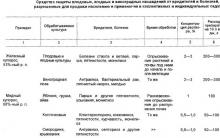
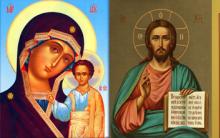
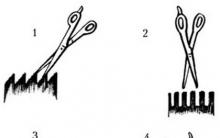

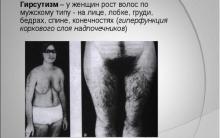
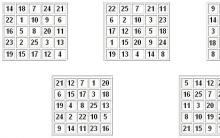




What to give a vegetarian for his birthday
Face cream at home - preparation rules
An ancient recipe for youth from Tibetan monks
How to drink clay to cleanse the body
Download maps slavic oracle